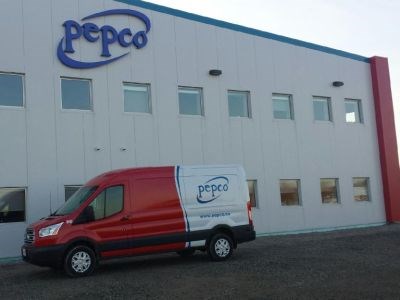With a brand-new $12-million building and an upcoming acquisition, Hearst-based Pepco is poised to further grow its share of the market as the only family-owned fuels and lubricants company operating throughout eastern Canada.
After years of expansion, and with various locations throughout town, it was time to streamline the operations, said CEO Luc Pepin, who runs the company with his brother, Denis.
“We needed space to accommodate our team, and we were renting a repair shop, and then we were renting office space and a bulk plant, a fuel terminal from Esso, so we thought we’d put everything together on the same site,” he said. “So that’s why we built.”
It’s a fitting milestone for the company, which is celebrating its 30th year of operation in 2016. The company distributes Esso fuels and Mobil lubricants, and provides industrial supplies, bearing and power transmission components, and heating and cooling services.
Its supply division distributes janitorial supplies and equipment, and safety, automotive, industrial, and spill cleanup supplies. Pepin says it’s part of Pepco’s business strategy to be a one-stop shop for customers as companies look to consolidate their purchasing habits.
“With the fuel business, we already represent, depending on the industry, 25 to 40 per cent of their buys, so by adding lubricants and industrial supplies and then the bearing and power transmission lines, it enables us to have a complete offer,” Pepin said.
“So we can go into a sawmill or a mine and offer them everything they need. We’re already in their supplier list, so it’s easy to add lines.”
The new facility comprises 5,000 square feet of office space, 4,000 square feet of warehouse space, and a two-bay repair shop, all under one roof. In addition to its Hearst headquarters, the company established a branch location in Montréal last year, and also acquired United Supply, based in Timmins, in 2015.
Despite its continued growth, however, Pepin said the family-owned company has no plans to relocate its headquarters from Northern Ontario.
“I find, for me, the quality of life up North is a lot better than in an urban area,” he said. “So I prefer to travel for work and live up North. That’s just a preference of mine.”
Integrated into the new facility are some unique features, such as a rail siding, which allows the company to efficiently move product around the country, and geothermal heating, which Pepin described as a cheaper, more eco-friendly heating option, even while recognizing the irony that presents coming from a fuel distributor.
But Pepco’s approach to sustainability mirrors that of its relationship with its customers: find ways to reduce their energy consumption.
“As a company, we have a strategy to be carbon-neutral by the end of 2017, so on the heating side, we’re already carbon-neutral, and we’re working to reduce our emissions,” he said. “Whatever we can’t reduce or eliminate, we’ll be planting trees to cover the rest.”
The Pepin family firmly planted its Northern business roots three decades ago when Pepin’s father, Jean-Guy Pepin, a fuels and lubricants deliveryman, created Pepco with just four employees.
Its service area expanded and by the early 2000s, Jean-Guy’s sons, Luc and Denis, had joined the business. A turning point for the company came in 2010.
“We grew a bit organically from ’86 onwards, but the real growth came in 2010 until today,” Pepin said. “In 2010, in the team we were about 10 people, including myself and my brother, and today we’re close to 150, and we’re closing on another acquisition on Sept. 30, which will put our team count up to 300.”
After Sept. 30, Pepco will have locations in Ontario, Québec, New Brunswick and Nova Scotia, he added.
The fast pace of expansion has come as a bit of a surprise.
Between 2010 and 2015, Pepco increased its revenue fivefold, and the goal was to double the size of the company from 2015 to 2020. Then the newest acquisition came along and that plan was accelerated by four years.
Pepin said the company will likely hold off from pursuing any additional acquisitions for the next 18 months as it adapts and streamlines its current operations. But it won’t say no to a good deal, either.
“It’s not to say that if something that makes sense would come about we wouldn’t look at it,” he said. “It’s just that we won’t be hunting for acquisition targets for the next little while.”




